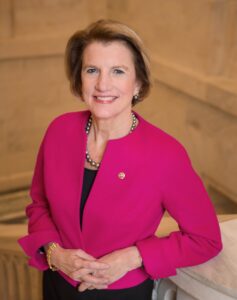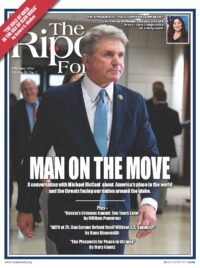
Like many of you, I am concerned about the effect that social media is having on America’s youth. I have eight grandchildren, and while I am glad that we are able to connect and stay in touch via social media, I am devastated to see the negative effects these platforms can have on children. It’s important that we do all we can to protect our children from online threats that pose a great risk to their development and their safety. These platforms must be responsible for the content provided to our youth and tools must be in place to prevent harm.
According to a U.S. Surgeon General’s report, social media presents a significant risk of harm to children. More specifically, the report tells us the average teenager spends at least 3.5 hours per day on social media platforms, while also noting that 64 percent of children are exposed to violent content, and a third of girls aged 11-15 say they feel addicted to social media platforms. On top of this, the report confirmed that usage of these apps has been linked to poor sleep quality in children. Our children should be focused on learning in school, not glued to TikTok videos in class.
Our children should be focused on learning in school, not glued to TikTok videos in class.
These troubling statistics show just how important it is for parents to have a say in their children’s social media usage. At the same time, online platforms must be responsible for the content provided to our youth and tools must be in place to prevent harm.
The Kids Online Safety Act, of which I am an original cosponsor, is one of the many tools that can help in this effort by shielding our most vulnerable population from patterned online risks.
Specifically, this legislation would require social media platforms to provide minors with options to protect their information, disable addictive product features, and opt out of algorithmic recommendations. The bill also gives parents new controls to help support their children and identify harmful behaviors, and provides parents and children with a dedicated channel to report harms to kids to the platform. To hold the platforms accountable, the bill also requires regular independent audits of social media platforms.
The bill gained momentum in the Commerce Committee, but unfortunately has not yet received a floor vote despite passing in committee last July. With your help in voicing support to your senators, we can continue to build momentum to bring this bill to the floor.
Another effort I’m working on that will help in our quest to protect our youth is legislation called the Eyes on the Board Act, which is being led by Commerce Committee Ranking Member Ted Cruz (R-TX) and Senator Ted Budd (R-NC). Currently, the Universal Service Fund’s E-Rate program helps connect schools to the internet so that every child has the same opportunities to learn. However, there is currently no provision that requires schools to prohibit the use of addictive social media apps that distract students. The Eyes on the Board Act would help tackle this problem by ensuring these dollars from the program are used for learning and not for children to use social media. Internet connectivity is vital for a 21st century education, but social media only serves as a distraction from online educational materials during the school day.
Internet connectivity is vital for a 21st century education, but social media only serves as a distraction from online educational materials during the school day.
The FCC is going forward with providing Wi-Fi access on school buses with the hope that kids can do their homework on long bus rides. However, because teachers are not present monitoring students’ internet usage on a bus ride, schools need to ensure that productive internet access is taking place, rather than allowing for students to scroll through their feeds and watch TikTok videos.
I recognize the enormous benefits that internet access holds for future generations, and I want more children to be connected, especially in West Virginia. However, putting more control in parents’ hands when it comes to the social media usage of their children is an important tool to keep children safe and healthy, just as is ensuring that kids are using internet access for school work instead of being distracted by social media posts.
Now is the time that we need to protect our children from dangers on social media platforms and we need to ensure they are learning while using a school’s internet connection.
U.S. Senator Shelley Moore Capito (R-WV) is a member of the U.S. Senate Committee on Commerce, Science, & Transportation, and also serves on the Appropriations, Environment & Public Works (EFW), and Rules Committees. Capito also serves as the vice chairman of the Senate Republican Conference, the 5th ranking Republican in the U.S. Senate.




